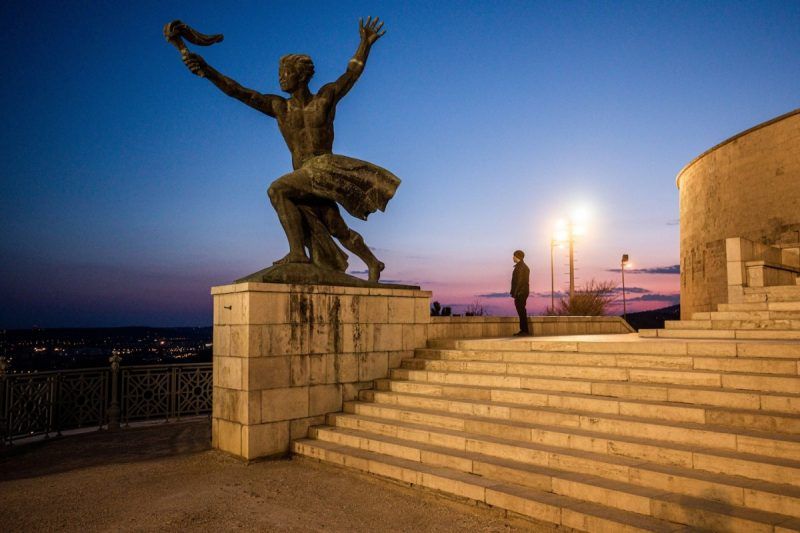
On Monday, Hungary’s Parliament granted Prime Minister Viktor Orbán the sweeping emergency powers he had asked for. Under the justification of the coronavirus epidemic, Orbán can suspend existing laws and rule by decree for an indefinite period.
No by-elections can be held while the emergency powers remain in place. Anyone the government views as spreading “falsehoods” or “distorted truths” that obstruct efforts to protect the public from the pandemic can be jailed for up to five years. In theory, Parliament could overturn the law with a two-thirds vote. In practice, Orbán’s Fidesz party dominates the body, and will probably allow Orbán to rule by fiat as long as he wants to.
Many observers have interpreted Hungary’s “Enabling Act” as the end of Hungarian democracy. However, political scientists had already concluded that Hungary was no longer a democracy some time ago.
Leading experts describe Hungary as a “competitive authoritarian” regime or “electoral autocracy”. The international ratings body Freedom House no longer considers Hungary a free country, while V-Dem no longer considers it a democracy (making it the first European Union member without these ratings).
However, even if Hungary were already an electoral autocracy, the coronavirus law marks a profound change.
Orbán wants to control the debate over coronavirus
Using an emergency to seize extraordinary powers is a standard authoritarian move. However, Orbán already had a two-thirds majority in Parliament, a constitutional court packed with partisan loyalists, and tight control over all levers of government power. So why risk rocking the boat with E.U. leaders, given his grip on power in Hungary already seemed so secure?
In part, it may be because he fears difficult political times are ahead. Orbán’s government has preferred to spend money on sports stadiums rather than on Hungary’s health care system, which is relatively poorly funded. That may mean the system buckles under the stress of the coronavirus crisis. More control over public debate could help him mute public opposition to his regime.
Furthermore, the regime’s legitimacy largely depends on its (claimed) economic success. That might disappear in a coronavirus-induced recession, and collapse of foreign direct investment. Even before the current crisis, the E.U. was talking about making it harder for Orbán to siphon off generous E.U. subsidies for the benefit of his backers.
As political analyst Péter Krekó has pointed out, the Orbán government has already used emergency powers to establish “a military task force to oversee the operation of 140 companies providing critical services”. The regime has plans in place for the government to take ownership stakes in companies that it bails out, suggesting Orbán may use this opportunity to increase his control of the economy.
And Orbán may want to use the coronavirus crisis to legitimize his own brand of authoritarian governance and to discredit the E.U. as a union of liberal democracies. Orbán has publicly stated his ambition to remake the E.U. along lines that better reflect his “illibera l” political philosophy. Grabbing power like this may demonstrate his impunity and encourage other aspiring authoritarians to build autocracies inside the E.U.
The E.U. is not rushing to condemn him
Orbán’s autogolpe (self-coup) may inflame tensions with the E.U. and endanger his party’s comfortable position as a member of Angela Merkel’s European People’s Party. However, over the past decade, Orbán has repeatedly counted on the E.U. being too distracted by other crises — the euro-zone crisis, the migration crisis and Brexit — to take action against him.
He may be betting again that other national and E.U. leaders are too preoccupied with addressing the pandemic and economic crisis to expend political capital standing up to him. Furthermore, it would be politically difficult for the E.U. to use its power to suspend the flows of E.U. subsidies to Hungary now, during a crisis in which Hungarians will already be suffering.
The initial reactions from E.U. leaders over the past two days suggest Orbán may win his bet. European Commission President Ursula von der Leyen, who relied on Orbán’s support to win office and who has been impeding efforts to crack down on his regime, issued an anodyne statement of disapproval, which failed to mention Orbán or Hungary by name — and only promised to “monitor, in a spirit of cooperation, the application of emergency measures in all Member States”.
A group of 13 E.U. governments issued a more strongly worded joint statement, but they too refused to call out Orbán by name and endorsed no specific actions other than calling on the European Commission to “monitor” the emergency measures of all E.U. members and for the Council of Ministers to discuss the issue “when appropriate”.
The most meaningful responses have come from members of Orbán’s political group — the European People’s Party (EPP). Leading figures from the Finnish National Coalition Party and Danish Conservatives have called for his ouster from the group and its faction in the European Parliament. While Angela Merkel’s CDU has been a longtime defender of the Orbán regime, one of her potential successors, Norbert Rӧttgen, made it clear his actions are unacceptable.
The EPP has supported and enabled Orbán for years, but his brazen power grab might finally get him thrown out of the center right bloc. However, Orbán has cultivated close ties with the PiS government in Poland and with other far-right parties such as Italy’s Lega, so he has new allies to turn to. As long as the E.U. does not suspend the flow of funds that props up his regime, he can probably continue to trample on the democratic values the E.U. claims to stand for, with little fear of meaningful sanction.
R. Daniel Kelemen is Professor of Political Science and Law at Rutgers University. Follow him on Twitter @rdanielkelemen.
